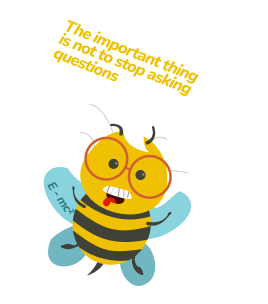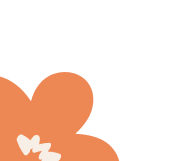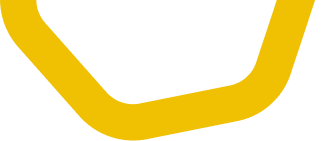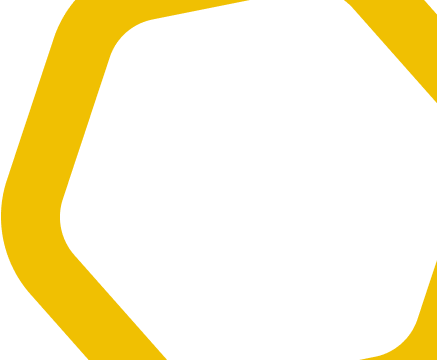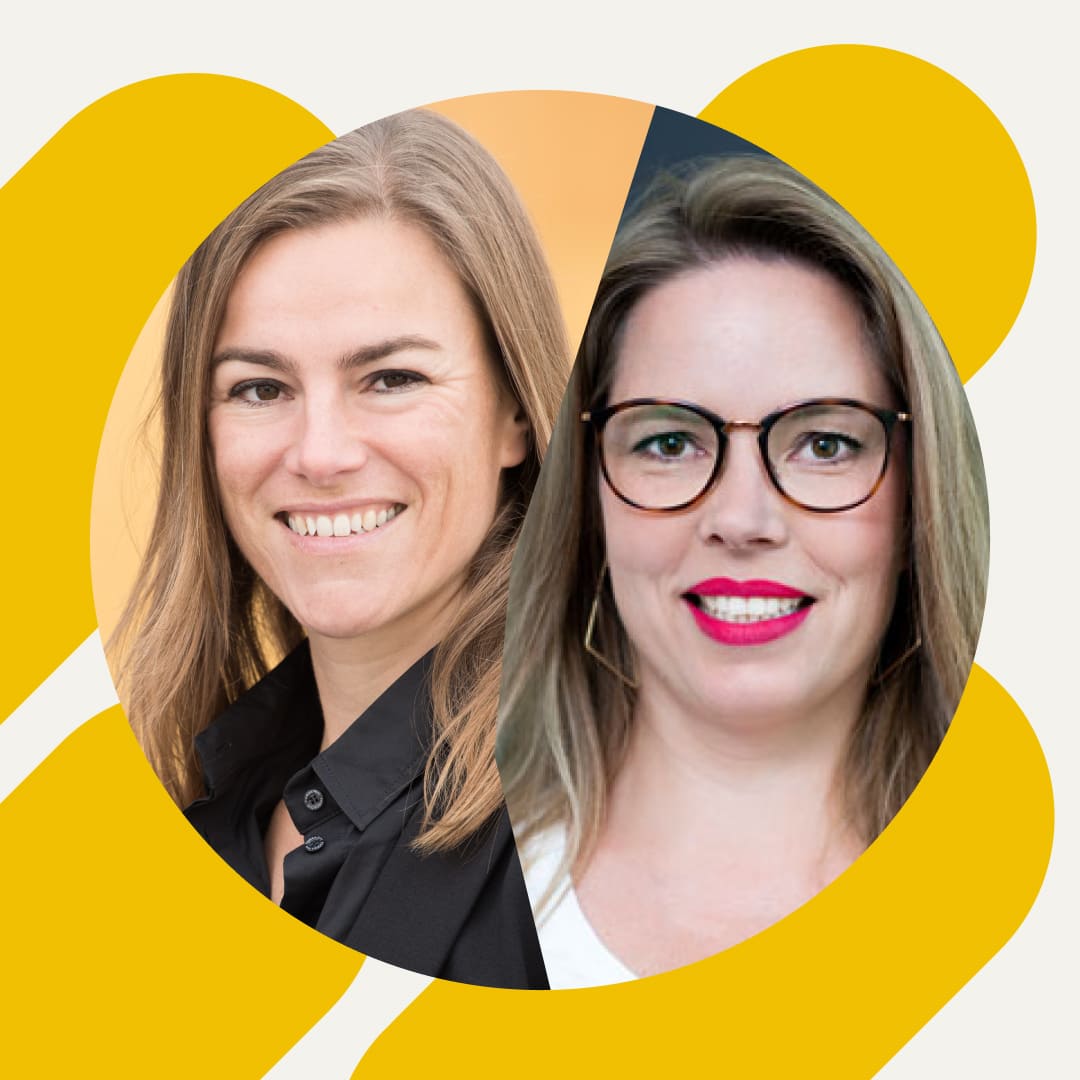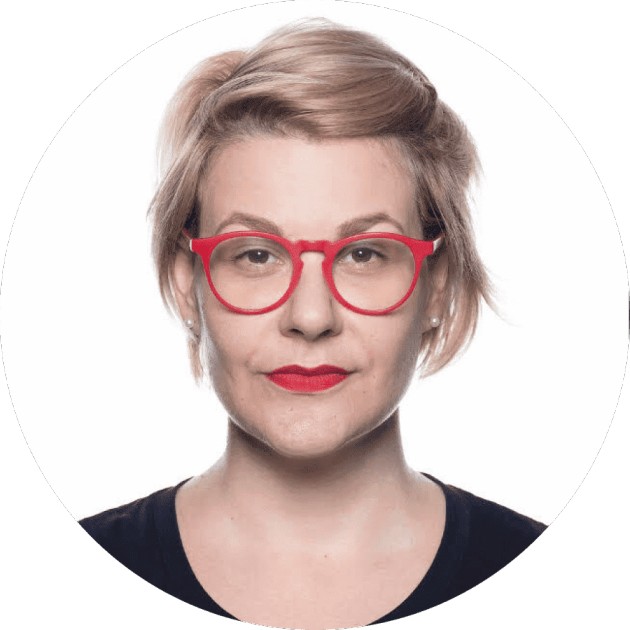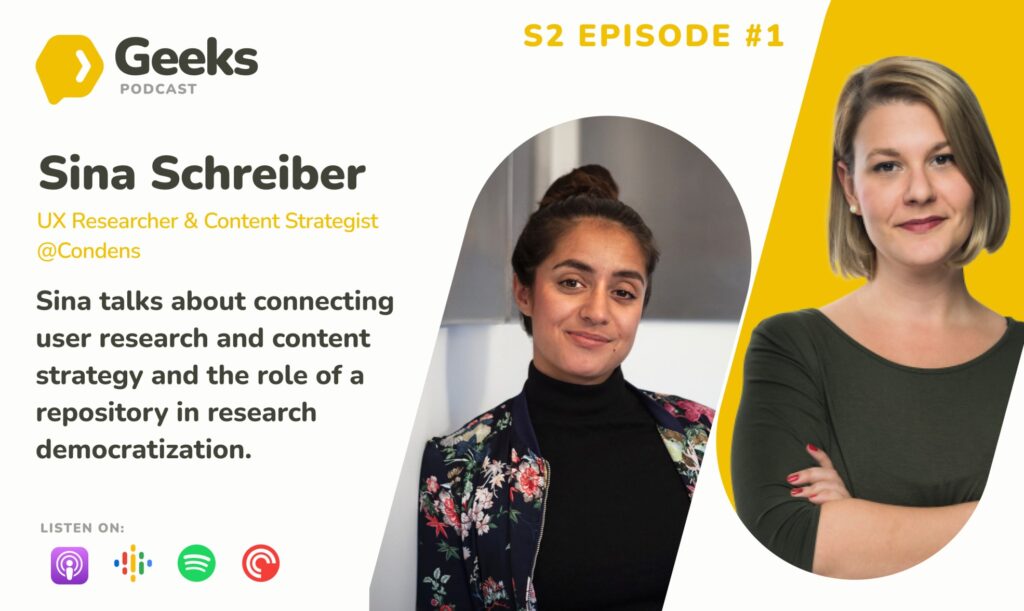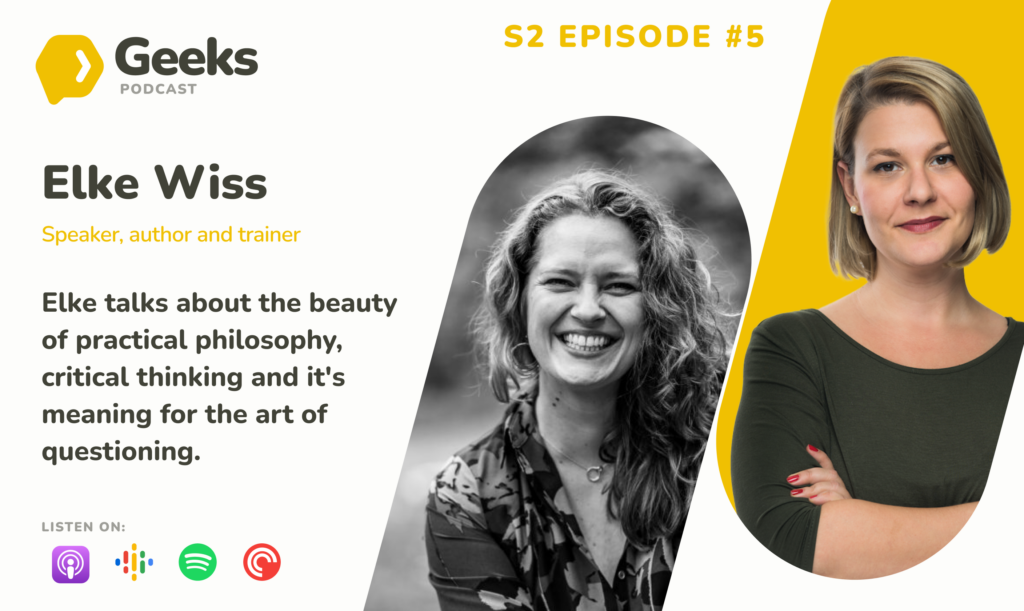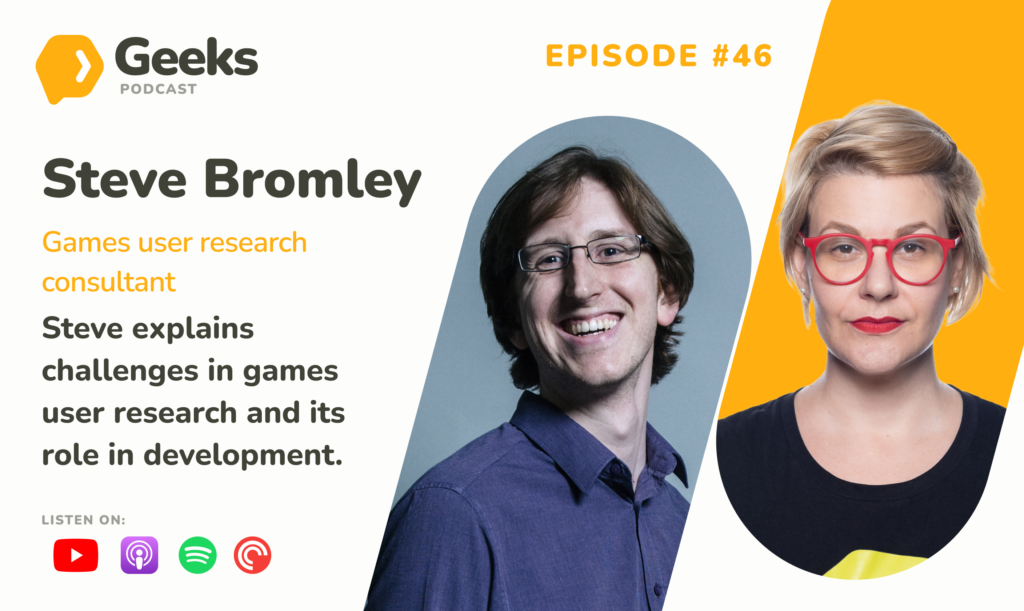Episode highlights
- 00:03:20 The Journey of UXinsight Festival
- 00:09:00 The Challenges and Triumphs of Organizing a Conference
- 00:19:14 The Theme of the Conference: Stay Curious, Be Bold
- 00:23:27 Speakers of UXinsight
- 00:25:33 Organizing Events: Tips and Tricks
About our guest Karin den Bouwmeester
Karin is the founder of UXinsight. With 20+ years of hands-on research experience, she’s determined to help the research community grow to a mature level. She loves to connect UX researchers from all over the world.
About our guest Debbie Slijpen
Debbie is UXinsight’s coordinator, planner and go-getter. She looks after our speakers, sponsors, trainers, participants and everyone we work with. She isn’t happy until everything – and everyone – is taken care of.
Podcast transcript
[00:00:00] Tina Ličková:
Welcome to UX Research Geeks, where we geek out with researchers from all around the world on topics they are passionate about. I’m your host Tina Ličková, a researcher and a strategist, and this podcast is brought to you by UXtweak, an all-in-one UX research tool.
You are tuning in into our conversation with Karin and Debbie, the creators behind the UXinsight Festival, a global gathering for UX researcher in Netherlands, REDA. In this episode, we’ll explore the evolution of the festival, discuss this year’s theme, Stay Curious, Be Bold, take a closer look at the challenges and opportunities in the ever changing landscape of organizing UXR events, join us for some insights and inspiration from these two remarkable professionals.
Hello, ladies.
[00:01:01] Karin den Bouwmeester: Hi, hello.
[00:01:02] Debbie Slijpen: Good morning. Hi.
[00:01:04] Tina Ličková: So this episode is with Karin and Debbie from UX Insight Festival. And before we start, we always do this thing so people have a little bit of context. Who are you?
[00:01:15] Karin den Bouwmeester: So I’m Karin. I live in the Netherlands. I am a UX researcher by profession, started in 2000. And I’m also the founder of UX Insight, a knowledge and network organization for and by UX researchers.
I am also a great fan of music festivals and I have three daughters, which I love to spend time with. That’s me in a nutshell.
[00:01:46] Tina Ličková: I didn’t know you have three daughters. That’s sweet. That’s nice. Thank you for sharing it. Debbie, what about you?
[00:01:54] Debbie Slijpen: I’m Debbie. I work as event manager and community manager at UX Insights with a background in event marketing and anthropology.
I started working at UX Insights for the preparations of the 2018 conference and was responsible for the practical and organizational part of the conference. I have a diverse background. Also, I’ve been an entrepreneur, but always working with people and I love to make everything run smoothly and keep an eye on everything and focus on details.
I live in Breda and I have two sons, twins actually. Yeah, very busy, but very nice. I love the small things in life, especially like sunny days, good conversation and especially food and drinks.
[00:02:43] Tina Ličková: I can relate to that, yeah.
[00:02:46] Debbie Slijpen: So I think that’s it about me.
[00:02:49] Tina Ličková: Thank you. Thank you for sharing with us. I am super, I wouldn’t say surprised, but if I know people organizing research events, conferences, whatever, it’s usually researchers doing it.
And that’s why even the question. When and how did you start a festival, two of you is more important for me to get the answer. So if you can enlighten me on the story of the festival, that will be great. And your cooperation, of course.
[00:03:20] Karin den Bouwmeester: Yeah, sure. So, like I mentioned, I’m a UX researcher myself, and I worked for different organizations before.
I worked in tech and I worked in agencies. And back in 2012, I started working as a freelancer. I wanted to give that a try. And I’ve worked for different organizations, like helping researchers out if they had struggled with difficult projects or lacked time. And I had conversations, of course, with them about their work and how they organize themselves.
And at a certain point, two of my customers were asking me, Karin, you talked to a lot of other researchers. Do you know, do you have some insights in how they built their UX research lab? So I thought about it and I asked other researchers in my network, would you like to share how you build your lab with some people?
And they said, I really love the idea of. Sharing more about my work with other peers, maybe not only about labs, but about all sorts of challenges. And I started organizing meetups. Most of the time we asked one of the organizations to host and then. invited two speakers to talk about the same topic, but with different perspectives.
And then there was always a lot of space to chat afterwards and discuss within groups how other organizations or independent researchers handled the challenge. And I love doing this and it was so great every time. But at a certain point, there were so many topics we wanted to discuss. I was talking to a group of befriended researchers and we were thinking like we should do a full day of just sharing and chatting with peers.
And that was actually the first edition of the UX Insight Festival. And halfway through the organization, we. Got the question by some of the participants or the speakers. Can we do it in English? So we thought, yeah, why not? We created half an English conference and half Dutch. And the first year to our surprise, we got visitors from other countries in Europe as well.
So that was actually how we started the conference. So at a certain point I couldn’t manage anymore and I started looking for help. And this is how Debbie came into the mix. So maybe Debbie, you can share a bit how that went.
[00:05:55] Debbie Slijpen: Of course. Actually, I met Karen through my previous job because I was helping different entrepreneurs with online marketing.
And I met Karen because she needed help with the organization for the conference. So I. started helping her out in 2018 and then actually visited the conference as well. And I was just immediately impressed with the level of the content that was shared there by the speakers, but also the entire setting.
So I was immediately very interested. It was just really great. And the collaboration with Karen was also working out pretty well. I’m a bit more well, focused on the organization, structured processes, et cetera. And Karen is of course the person who’s more about the content of the program. And that turned out to be a good match.
So then I was actually on the point of looking for a new job and then Karen was looking for someone, and then we started talking to each other and then we thought we should try and actually be a team for 2020 conference, but then the whole. Corona situation came along. So it was quite a challenge for our first actual teamwork, but yeah, it turned out to be a good collaboration.
Let’s see how it turns out in 2024.
[00:07:19] Tina Ličková: Karin, did you want it to say something? I felt like you were coming with some air out of your mouth.
[00:07:24] Karin den Bouwmeester: Yeah. It’s definitely worked out very well. It’s been great working with Debbie and I. She really helps professionalized. It’s like we started just a hobby and now I feel like we’re turning into a professional conference slowly.
So yeah, it’s been a great ride. Yeah.
[00:07:43] Debbie Slijpen: But still having a lot of fun on the way.
[00:07:46] Karin den Bouwmeester: Definitely. Definitely. Yeah.
[00:07:47] Tina Ličková: Nice. You’re having Debbie as a help and as a manager, even manager. It sounds like a dream. To me, because if you are saying those sentences, I love organizing and I love giving information. People don’t know what they need.
I’m like, I want to have you as well.
[00:08:03] Debbie Slijpen: Yeah, we all want to have a Debbie.
[00:08:06] Tina Ličková: I will go now to the creative part because that’s where you and you were mentioning it, our meeting. Or overlap. And we have to also mention that I was in the curators committee. So I was among those seven people who were going over the proposals.
We had a lot of proposals to go through and I was just amazed by the whole process. First of all, very organized, very well structured. This is also my feedback to you. And secondly, it needs also the organization stuff also needs a lot of creativity and what it came to, what is the outcome is super creative as well.
So maybe let’s deep dive into the. whole thing on how you start organizing a conference in a year and how do you come with to make some decisions.
[00:09:00] Karin den Bouwmeester: It has been a very interesting challenge this year. Like you mentioned, what we do after the summer. So in September, we always open up a call for speakers. We invite any UX researcher out there to send in their proposal if they want to, to talk about something or organize a workshop.
But this year we received over 200 proposals. So that was amazing. For us, it’s very important to have a creation team. That is helping with going over all the proposals and we try to build a different team every year and we are also very conscious to, to build a team with a diverse group of researchers.
They’re all researchers with quite some experience, but they’re from different countries, different type of organization, different kind of backgrounds. make sure that we don’t have like this narrow view of reviewing proposals and get a, also get a balanced program. We start with an anonymous review. So all the proposals are reviewed solely by their contents, like the outline of the talk and the main message of the talk reviewed by two of the curators. And then afterwards, if we still think this is, this can be relevant for the program, then we look at the speaking skills of the speaker and the speaker, yeah, the skills and the way they speak. And then we have this shortlist. Although it’s, wasn’t very short this year, but we tried to create a short list of talks and make a selection with the creation team.
And that’s a very messy process. Tina, you were part of it, so you can maybe also share how you experienced it, but it’s a messy process. It’s very difficult because there’s so many interesting talks and different viewpoints and things you want to include in a program. But on the other hand, we only have three days. And there’s so much information that our audience can take, right? You cannot overload.
So it’s a difficult process to get to the final selection. But this is something we do in September, October, November. And in the meantime, in the background, Debbie is also already starting organizing more of the practical part of the conference.
Yeah. Debbie, can you share with, not everything, because we need more than an hour, but some of the important stuff that’s going on in the background.
[00:11:46] Debbie Slijpen: Of course, I’m there to support the program committee and also sometimes I’m. helping out a bit to see what kind of topics are discussing on higher level with Karen, what way to go or of those kinds of things, but more in a practical sense, I’m also contacting people which we need more information from, but we try to limit that.
Because yeah, of the number of proposals, it’s just too difficult, but also actually already before summer, we start preparing based on the feedback we got from the festival before preparing for the speakers, for the sponsors. We already have discussions with sponsors who want to be part of the upcoming event, but also the speakers.
We try to create a process that is as smooth as possible and to give as much as info. As much information as they need in a structured way, which is quite a challenge because we have so many things to think about. We need to know, of course, if they are available. We need to know when they are traveling.
We need to give them information on all kinds of things because a lot of people are also traveling international. They need to know all these details. And so this year I created a webpage for all the speakers. based on feedback from years before, but also start working on communication and making the process as structured as possible.
And we already know like the, actually starting from now, starting from January until the festival are like crazy months for us. So we try to take all the work we can prepare already in the months before to do it before. And. That is still a challenge, but each year we get a little bit better at doing so.
And then also, of course, starting the promotions and informing people that the ticket sales is coming up and letting people know that we are here and that we are, we will have an amazing program again for them. So that’s also something I’m. working on during those months.
[00:13:51] Tina Ličková: I’m just getting into panic when you are talking about it and you, I’m looking at you and you talk about it with such calmness and peacefulness. My respect.
[00:14:02] Karin den Bouwmeester: I feel we had the worst situation when we organized the conference for 2020. And we thought that it would be a three day conference in Breda in the Netherlands. And two months, one and a half month before we learned that we couldn’t do the events in person and we had to switch to the online version.
And then we did the first online conference. We didn’t have any experience with that. And we. thought we have so many talks, it’s too much for online to do it in three days, so let’s do it in five days. That was our brilliant idea. That was so incredibly stressful to organize that for the first time. It was, and now we all feel normal having online conferences and online events, but Then there was not so much and we had to learn about the tech and we had to learn how to invite people in and there were so many questions by people.
It was like the most stressful event. So after that, everything seems like a breeze.
[00:15:11] Tina Ličková: I want to emphasize how well you did in 2020 because that was my first year. And I was really hoping to travel. I didn’t, of course. And I was like, Oh my God, now I’m going to stay again in front of the computer, in front of Zoom.
And if I am not a person easy to please with conference content, and I am not easy to please online, I think it has to do with attention things, and I’m also super critical because I’m coming from a My original is coming from the training and HR consultancy. So I’m super critical towards the people speaking out of maybe different reasons.
We can, I don’t have to go to the psychology of me now, but it was just great. It was interesting workshops. It was a trusting platform to be there. I felt like I could connect. So that’s why I’m really looking to the offline thing.
[00:16:14] Debbie Slijpen: Thank you very much.
[00:16:15] Karin den Bouwmeester: I think for us, it’s. The content, the talks are very important, right?
It’s the base of your conference, but the real added value of a conference is. in the conversations after. It’s like when people digest what they just learned and discuss it with others, then like the magic happens. And this is, this always has been an important part of our conference, to have enough space for people to interact, enough room to think about what you just learned and how to, how it can impact your own work.
But for online, it’s more difficult to get that same connection going, that, that is a challenge. And still, we now organize a hybrid version of the conference, but for the online, it’s still difficult to get that same energy going on.
[00:17:07] Debbie Slijpen: Although we did get the feedback that especially last two years that it worked out pretty well, but it’s also due to our hosts who are very conscious about connecting the online audience to the in person audience.
And I think that works very well that we also, during the organizing and talking to the hosts and how can we build the program in general, not only on stage, but in general, that we keep. Try to keep in mind all the time. What can we do for the online audience? How can we make the exercises and the interactivity in a certain way so that the online people can also participate.
And they also profit from the things we do in person. And of course there’s a difference. That’s something we cannot replace, but it’s also a different type of ticket, of course you get. But we, with every activity we do, we try to keep in mind how to also connect the online audience to the conference. And so it’s also important to us because, yeah, we also really want to make it accessible for as many people as possible. And there are many people who cannot travel because it’s too far, because they don’t have the time, because they don’t have the money, because they don’t want to. There are, of course, many reasons.
But yeah, it’s, yeah, it’s, we aim to have it accessible for as many as we can.
[00:18:29] Tina Ličková: It was also interesting to observe and be part of the process, how we, you didn’t, I know conferences, for example, one that I’m moderating a slot where the folks there are always looking at the political situation because they are an LGBTQ plus NGO and they come up with the topic of the conference first and then look for speakers around Eastern and Western Europe.
They want to connect those two parts. You really went in this. organic way or direction where you were looking at the, as you were describing the process, and then came up, okay, this is where it all meets. So where did it all meet?
[00:19:14] Karin den Bouwmeester: It was very interesting because last year we saw a lot of talks about self care, about reflection, about taking the time, about being mindful.
This year, we saw a lot of talks about experimenting, new things, trying out, being out forward more. It got to the point, it’s always difficult to find like the word for it, but we saw like adventure, curiosity, going beyond what you know, and ended up with the statement, stay curious, be bold, as a theme for the course.
conference. And I think it’s very interesting that this is actually what seems to be happening within the community.
[00:20:07] Tina Ličková: As a researcher, I think that I assume what is the curiosity in the state curious, be bold statement. But when it comes to the boldness, if you could explain it a little bit more to our audience, because being bold is something that the researchers I know I wouldn’t say struggle with, but it’s, it has to be very well portioned.
[00:20:33] Karin den Bouwmeester: Yes, absolutely. I think I see your point. Generally speaking, I feel that a lot of researchers are very modest and what we also see and In the beginning, it was difficult to find speakers to go on stage because it seems to be in the nature of a lot of UX research to feel that they don’t have enough information, that they want to learn more, that they don’t have all the answers, and then it’s difficult to, well, be bold and go on stage and take your stand.
And it feels to me like the research field is, on the one hand, maturing, So that’s a good thing. We see more and more UX research leads. We see managers. We see directors. We see more talk about strategy. We see growing teams, etc. So that’s a good thing. On the other hand, we also see like threats going out.
AI is something, a topic that is mentioned a lot and will also be part of the program. Researchers feel worried that AI might take over part of what we do or at least we need to think about what is our role with AI and how do we connect. That is one thing from not within Europe so much but from the United States we see a lot of layoffs of course so a lot of People got fired and now thinking about what happened there.
Why did we get fired? What is it that organization think that UX researchers are not required anymore? So I think it’s on the one hand, It’s also a message to the community, be bold and get out there and think about what we are as researchers and where our added value is and communicate that to the world as well.
[00:22:35] Tina Ličková: I am happy to listen to you saying that the business and our field is maturing because of this, what is happening. It’s not exactly. Easy time for many researchers, not only in the US, but also in other markets. And Europe is also way better than us, but still a little bit wobbly.
[00:22:57] Karin den Bouwmeester: Yes, definitely.
[00:22:58] Tina Ličková: So I think we can, and I’m staying positive in this, like we, every crisis brings new opportunities.
I would like to bring more to the present because I like what you said. To close it up, I have two questions and I will start with the one. That is for sure something that people want to know. Who are the speakers of the conference and who would you like to invite to see?
[00:23:27] Karin den Bouwmeester: I can already mention a couple of names.
We have, for example, Lucas Lemasters and Francisco Giurfa (Paco). I’m not completely 100 percent sure I will pronounce his last name correctly, Jurefa from American Airlines. They will do a workshop on measuring UX. We have, for example, Emma Craig from Miro. She is going to talk about our role as UX researchers in innovation and how important that is.
We also have Corinne Schillizzi. She is the author of a book called Machine Learning, so she will be talking about machine learning and what our role as UX researchers should be. There. We have our own host, Nidhi Jalwal and her colleague Marie de Vos from ikea. They will share how IKEA is currently looking at the future of UX research and how their team, uh, created a blueprint.
So that’s, I think, also very exciting. And maybe without mentioning all the names, I think that the program is really about. A lot of the talks are about what are we as UX researchers with this field that is changing? What is AI going to do for us? What does it mean for our role? But also how can we make sure that we use our UX research skills to be more bold?
For example, we have a talk about how we can use our research skills to pitch to the CEO. And one of the talk is, for example, about building a UX research strategy when you work in a more scattered or remote UX research team. Also very relevant. A lot of the talks are about looking at our role and the changing environment and what it means and how we can create a future for ourselves as well. What is the role of the UX researcher in this future?
[00:25:33] Tina Ličková: We were mentioning, or we were talking a lot about the organization and the collaboration between the event management expertise and the research expertise, because I know a lot of people are locally or cross country organizing events.
What would be the hacks that you would advise researchers to do or not to do?
[00:25:55] Debbie Slijpen: I would advise to keep it close to yourself and to put your own personality into your job. I feel the success, or at least what we experience as the success of UX Insights Festival and all the work we do is, These are the personal connections we have with the people we work with.
But with the community in general, that’s something we get back also from our attendees, from our speakers, from our sponsors. They feel like it’s a warm bath. They feel very seen. They feel like they can have a. role they want to. Some people want to get on stage. Others really don’t. Some people want to interact.
Other people don’t. And I think that’s also something we as people Karen and I struggle with. We are also not stage people, but we sometimes need to take the stage like today. Thank you, Tina. But I think as long as you put your personality into it and it’s just something that’s coming out. from yourself.
It’s something that comes natural. So I think for me, especially the personal interaction with everyone who has a role in the festival, if you’re in the audience or any other role as a speaker or as a host or as a team member, I think that’s something you should put into.
[00:27:16] Tina Ličková: Very surprising advice. I thought you were going to give it, but it’s a nice one because I always say, be yourself. Everybody else is taken.
[00:27:24] Karin den Bouwmeester: Exactly.
[00:27:26] Debbie Slijpen: But I think it helps in making it fun for yourself, making you feel good about what you do. And it helps creating relations that are also in the end helpful for organizing and promoting and doing all those kinds of things. It’s, but if it comes natural, then it doesn’t feel forced.
So I think people will notice that you create a community that’s also enthusiastic about what you’re doing. Um, I think, yeah, that’s the way to go about it.
[00:27:57] Karin den Bouwmeester: What is very helpful is that UX researchers generally are very curious and open minded people, so it’s a lovely community to work within.
[00:28:08] Tina Ličková: Great. Ladies, thank you very much for speaking to me. Thank you for sharing a lot of the details and a lot of backstage, because that’s also something to appreciate. I wish us all, because I will be there, hopefully supporting you and not making a mess in between, wish you a successful Conference festival and see you soon.
[00:28:33] Karin den Bouwmeester: Thank you, and looking forward to it very much.
[00:28:36] Debbie Slijpen: Thanks so much for inviting us.
[00:28:48] Tina Ličková:
Thank you for listening to UX Research Geeks. If you liked this episode, don’t forget to share it with your friends, leave a review on your favorite podcast platform, and subscribe to stay updated when a new episode comes out.
💡 This podcast was brought to you by UXtweak, an all-in-one UX research software.
